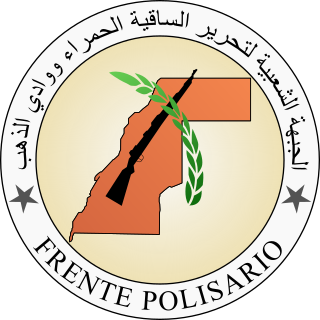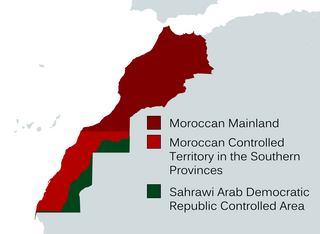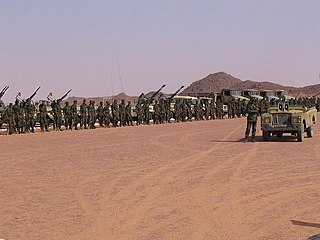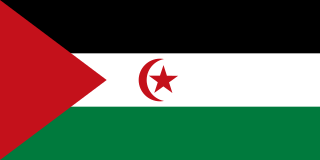
Western Sahara is a disputed territory on the northwest coast of Africa. About 20% of the territory is controlled by the Sahrawi Arab Democratic Republic (SADR); the remaining 80% is occupied and administered by neighboring Morocco. It has a surface area of 266,000 square kilometres (103,000 sq mi). It is the second most sparsely populated country in the world and most sparsely in Africa, mainly consisting of desert flatlands. The population is estimated at about 500,000, of which nearly 40% live in Morocco-controlled Laayoune, the largest city in Western Sahara.
The history of Western Sahara can be traced back to the times of Carthaginian explorer Hanno the Navigator in the 5th century BC. Though few historical records are left from that period, Western Sahara's modern history has its roots linked to some nomadic groups such as the Sanhaja group, and the introduction of Islam and the Arabic language at the end of the 8th century AD.

Western Sahara, formerly the Spanish colony of Spanish Sahara, is a disputed territory claimed by both the Kingdom of Morocco and the Popular Front for the Liberation of the Saguia el Hamra and Rio de Oro, which is an independence movement based in Tifariti and Bir Lehlou. The Annexation of Western Sahara by Morocco took place in two stages, in 1976 and 1979, and is considered illegal under international law.

The Polisario Front, Frente Polisario, Frelisario or simply Polisario, is a rebel Sahrawi nationalist liberation movement claiming Western Sahara.

Spanish Sahara, officially the Spanish Possessions in the Sahara from 1884 to 1958, then Province of the Sahara between 1958 and 1976, was the name used for the modern territory of Western Sahara when it was occupied and ruled by Spain between 1884 and 1976. It had been one of the most recent acquisitions, as well as one of the last remaining holdings, of the Spanish Empire, which had once extended from the Americas to the Spanish East Indies.

The Green March was a strategic mass demonstration in November 1975, coordinated by the Moroccan government and military, to force Spain to hand over the disputed, autonomous semi-metropolitan province of Spanish Sahara to Morocco. The Spanish government was preparing to abandon the territory as part of the decolonization of Africa, just as it had granted independence to Equatorial Guinea in 1968. The native inhabitants, the Sahrawi people, aspired to form an independent state. The demonstration of some 350,000 Moroccans advanced several kilometers into the Western Sahara territory. Morocco later gained control of most of the former Spanish Sahara, which it continues to hold.

The Madrid Accords, formally the Declaration of Principles on Western Sahara, was a treaty between Spain, Morocco, and Mauritania setting out six principles which would end the Spanish presence in the territory of Spanish Sahara and arrange a temporary administration in the area pending a referendum.

The Southern Provinces or Moroccan Sahara are the terms utilized by the Moroccan government to refer to the occupied territory of Western Sahara. These designations encompass the entirety of Western Sahara, which spans three of Morocco's 12 top-level administrative regions. The term "Southern Provinces" is frequently used on Moroccan state television.

The International Court of Justice Advisory Opinion on Western Sahara was a 1975 advisory, non-binding opinion by the International Court of Justice (ICJ) of two questions presented to it by the UN General Assembly under Resolution 3292 regarding the disputed territory of Western Sahara. Morocco had approached the UN to adjudicate its and Mauritania's claims over the territory.

Tiris al-Gharbiyya was the name for the area of Western Sahara under Mauritanian control between 1975 and 1979.

The Western Sahara conflict is an ongoing conflict between the Sahrawi Arab Democratic Republic/Polisario Front and the Kingdom of Morocco. The conflict originated from an insurgency by the Polisario Front against Spanish colonial forces from 1973 to 1975 and the subsequent Western Sahara War against Morocco between 1975 and 1991. Today the conflict is dominated by unarmed civil campaigns of the Polisario Front and their self-proclaimed SADR state to gain fully recognized independence for Western Sahara.

The politics of the Sahrawi Arab Democratic Republic refers to politics of the Polisario Front's proclaimed Sahrawi Arab Democratic Republic, a country in North Africa with limited recognition by other states, controlling parts of the Western Sahara region.

The Western Sahara War was an armed struggle between the Sahrawi indigenous Polisario Front and Morocco from 1975 to 1991, being the most significant phase of the Western Sahara conflict. The conflict erupted after the withdrawal of Spain from the Spanish Sahara in accordance with the Madrid Accords, by which it transferred administrative control of the territory to Morocco and Mauritania, but not sovereignty. In late 1975, the Moroccan government organized the Green March of some 350,000 Moroccan citizens, escorted by around 20,000 troops, who entered Western Sahara, trying to establish a Moroccan presence. While at first met with just minor resistance by the Polisario Front, Morocco later engaged a long period of guerrilla warfare with the Sahrawi nationalists. During the late 1970s, the Polisario Front, desiring to establish an independent state in the territory, attempted to fight both Mauritania and Morocco. In 1979, Mauritania withdrew from the conflict after signing a peace treaty with the Polisario Front. The war continued in low intensity throughout the 1980s, though Morocco made several attempts to take the upper hand in 1989–1991. A cease-fire agreement was finally reached between the Polisario Front and Morocco in September 1991. Some sources put the final death toll between 10,000 and 20,000 people.

In the 1970s in Morocco, after two coup attempts in 1971 and 1972, the patriotism engendered by Morocco's participation in the Middle East conflict and by the events in Western Sahara contributed to Hassan's popularity and strengthened his hand politically despite serious domestic turmoil. The king had dispatched Moroccan troops to the Sinai front after the outbreak of Arab-Israeli War in October 1973. Although they arrived too late to engage in hostilities, the action won Morocco goodwill among other Arab states. Shortly thereafter, the attention of the government turned to the annexation of then Spanish Sahara from Spain, an issue on which all major domestic parties agreed.

Sahrawi nationality law is the law of the Sahrawi Arab Democratic Republic's (SADR) governing nationality and citizenship. The SADR is a partially recognized state which claims sovereignty over the entire territory of Western Sahara, but only administers part of it. The SADR also administers Sahrawi refugee camps.

Mauritania, officially the Islamic Republic of Mauritania, is an Arab Maghreb country in West Africa. It is bordered by the Atlantic Ocean in the west, by Morocco in the north, by Algeria in the northeast, by Mali in the east and southeast, and by Senegal in the southwest. It is named after the ancient Berber Kingdom of Mauretania, which later became a province of the Roman Empire, even though the modern Mauritania covers a territory far to the south of the old Berber kingdom that had no relation with it.

Annexation, in international law, is the forcible acquisition and assertion of legal title over one state's territory by another state, usually following military occupation of the territory. In current international law, it is generally held to be an illegal act. Annexation is a unilateral act where territory is seized and held by one state, as distinct from the complete conquest of another country, and differs from cession, in which territory is given or sold through treaty.
The Western Sahara peace process refers to the international efforts to resolve the Western Sahara conflict. The conflict has failed so far to result in permanent peace between Morocco and the Polisario Front. The standing issues of the peace process include Sahrawi refugees, and human rights in Western Sahara.

Sahrawi nationalism is a political ideology that seeks self-determination of the Sahrawi people, the indigenous population of Western Sahara. It has historically been represented by the Polisario Front. It came as a reaction against Spanish colonialist policies imposed from 1958 on, and subsequently in reaction to the Mauritanian and Moroccan invasions of 1975.

The Morocco–Western Sahara border is 444 kilometres (276 mi) in length and runs from Atlantic Ocean in the west, to the tripoint with Algeria in the east. The border has existed purely in a de jure sense since Morocco's annexation of Western Sahara in 1976–1979.















